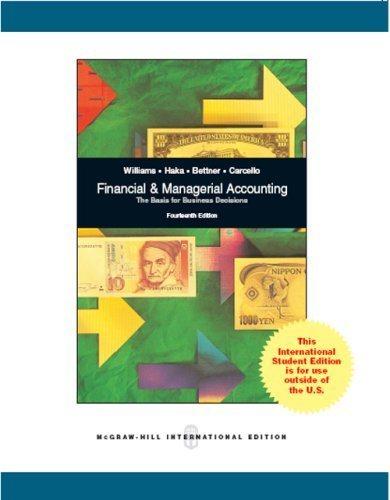Super Star, a Hollywood publicity firm, uses the balance sheet approach to estimate uncollectible accounts expense. At
Question:
Super Star, a Hollywood publicity firm, uses the balance sheet approach to estimate uncollectible accounts expense. At year-end, an aging of the accounts receivable produced the following five groupings:
a. Not yet due . . . . . . . . . . . . . . . . . . . . . . . . . . . . . . . . . . . . . . . . . . . . . . . . . . . .. . . $500,000
b. 1–30 days past due . . . . . . . . . . . . . . . . . . . . . . . . . . . . . . . . . . . . . . . . . . . . . ... . 210,000
c. 31–60 days past due . . . . . . . . . . . . . . . . . . . . . . . . . . . . . . . . . . . . . . . . . . . ..... . . 80,000
d. 61–90 days past due . . . . . . . . . . . . . . . . . . . . . . . . . . . . . . . . . . . . . . . . . . . .. . . 15,000
e. Over 90 days past due . . . . . . . . . . . . . . . . . . . . . . . . . . . . . . . . . . . . . . . . . . . ..... . 30,000
Total . . . . . . . . . . . . . . . . . . . . . . . . . . . . . . . . . . . . . . . . . . . . . . . . . . . . . . . . .. . . $835,000
On the basis of past experience, the company estimated the percentages probably uncollectible for the above five age groups to be as follows: Group a, 1 percent; Group b, 3 percent; Group c, 10 percent; Group d, 20 percent; and Group e, 50 percent.
The Allowance for Doubtful Accounts before adjustment at December 31 showed a credit balance of $11,800.
Instructions
a. Compute the estimated amount of uncollectible accounts based on the above classification by age groups.
b. Prepare the adjusting entry needed to bring the Allowance for Doubtful Accounts to the proper amount.
c. Assume that on January 10 of the following year, Super Star learned that an account receivable that had originated on September 1 in the amount of $8,250 was worthless because of the bankruptcy of the client, April Showers. Prepare the journal entry required on January 10 to write off this account.
d. The firm is considering the adoption of a policy whereby clients whose outstanding accounts become more than 60 days past due will be required to sign an interest-bearing note for the full amount of their outstanding balance. What advantages would such a policy offer?
Accounts receivables are debts owed to your company, usually from sales on credit. Accounts receivable is business asset, the sum of the money owed to you by customers who haven’t paid.The standard procedure in business-to-business sales is that... Balance Sheet
Balance sheet is a statement of the financial position of a business that list all the assets, liabilities, and owner’s equity and shareholder’s equity at a particular point of time. A balance sheet is also called as a “statement of financial...
Step by Step Answer:

Financial And Managerial Accounting
ISBN: 12
14th International Edition
Authors: Jan R. Williams, Joseph V. Carcello, Mark S. Bettner, Sue Haka, Susan F. Haka





